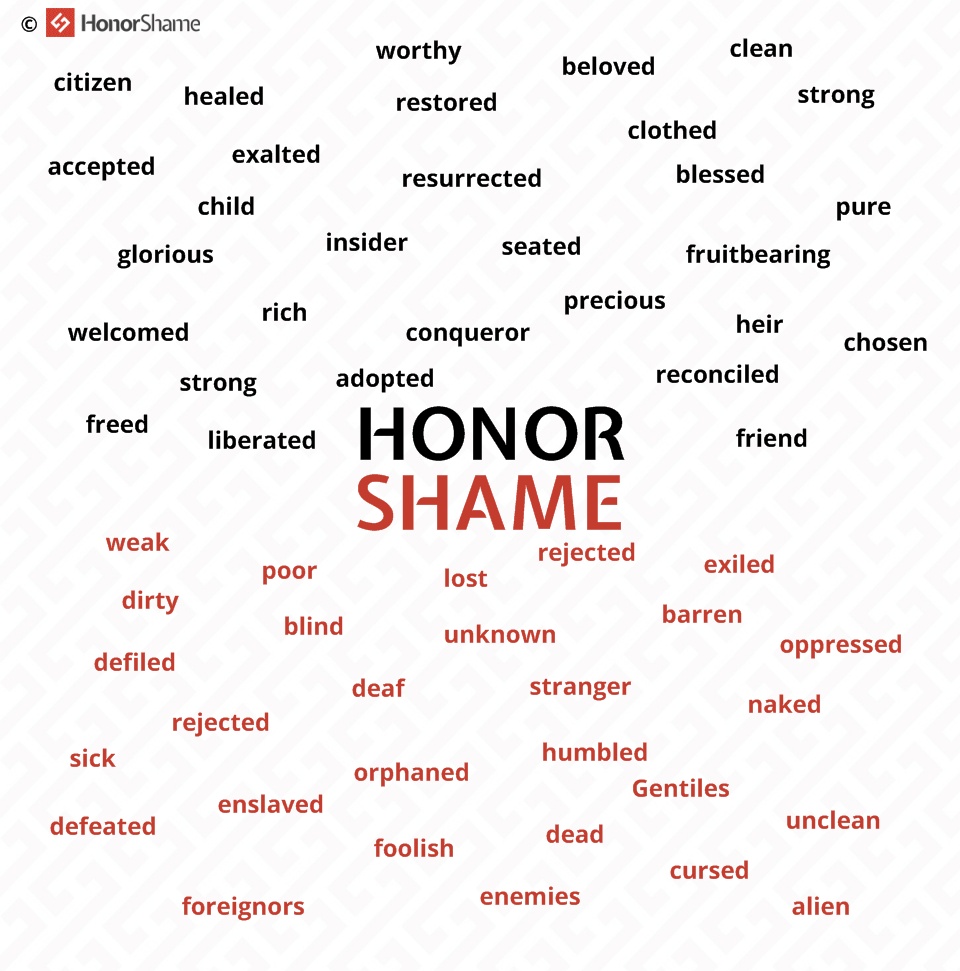6 Places Honor & Shame Hide in the Bible
Here is something we have all experienced: You are looking to buy a new car, and begin eyeing (for example) the Toyota Corolla. Now that you are thinking about buying a Corolla, they begin popping everywhere on the road! Where were they hiding this whole time?

There has to be a sociological term for this, because it is a universal phenomenon. When something new comes onto your radar, you begin seeing it everywhere. This is true not only of tangible things, but ideas as well – if you learn a new concept, you recognize it frequently thereafter.
The themes of honor and shame permeate the Bible, but they often “hide” in our Western blind spots. By knowing where honor and shame are typically found, we can begin to uncover amazing Biblical truths .
Here are six ways biblical writers package their ideas about honor and shame.
1) Propositions – The Bible makes explicit comments about ‘shame’, ‘disgrace’, ‘glory’, ‘name’, ‘honor’, ‘reputation’, etc.. We often read right over these words. Did you know the words ‘shame’, ‘honor’, and ‘glory’ appear 40 times in Romans (while ‘guilt’, ‘innocence’, and ‘forgiveness’ appear only twice in Romans)? Don’t forget to see the most obvious!
- “My salvation and honor depend upon God,” Ps 62:7
- “Whoever believes in him will not be put to shame. So the honor is for you who believe,” 1 Peter 2:6-7
2) Metaphors – Biblical authors often employ metaphors from the tangible world to communicate our status transposition (from shame to honor) in the spiritual realm. Our new honor in Christ is abstract, so we need concrete images to grasp it.
- “He raises up the poor from the dust; he lifts the needy from the ash heap, to make them sit with princes and inherit a seat of honor.” 1 Sam 2:7-8
- “So then you are no longer strangers and aliens, but you are citizens with the saints and also members of the household of God” Eph 2:19

3) Narratives – OT writers often told stories about faithful Israelites being exalted from the threat of shame unto honor. Without using any explicit words, they show how Yahweh’s salvation included honor for his people.
- Notable examples include: Adam, Abraham, Joseph, Moses, David, Mephibosheth, Hannah, Esther/Mordecai, Daniel and friends, Haggai, etc.
- A previous post examined Job this way.
4) Genealogies – Honor (and shame) is determined primarily by the group you belong to. So to know your identity and status, you must know your family. For this reason, genealogies are perhaps the most basic way honor is communicated in the Bible.
- The book of Ruth concludes with a genealogy connecting Naomi to the great king David (Ruth 4:16-21).
- The NT comes out of the gate with 17 verses of sizzling birth announcements (Matt 1:1-17)! There is hardly a more effective way to communicate the honor of God’s only begotten Son.
5) Covenants – Ancient Near Eastern covenants formed family-like relationships. Such covenants, in which Yawheh as the patron commits to honor someone (for the sake of His own honor!), were the cornerstone of Israel’s worldview and theology.
- Abram is covenanted land, blessings, peace, descendants, and global benefaction – a marks of honor (Gen 12:1-3).
- David is promised the virtually every type of ancient honor (read over 2 Sam 7:8-16).
6) Symbols – Since honor and shame are invisible social values, cultures must tangibly symbolize people’s status through food, clothes, colors, crowns, thrones, blood, names, head, face, feet and many other ways. All these physical objects carry social meaning. They confer honor (or shame).
- The Prodigal Son’s Father said, ‘Bring quickly the best robe, and put it on him, and put a ring on his hand, and shoes on his feet. And bring the fattened calf and kill it, and let us eat and celebrate (Luke 15:22-23).
- “So Hanun took David’s servants and shaved off half the beard of each and cut off their garments in the middle, at their hips, and sent them away. When it was told David, he sent to meet them, for the men were greatly ashamed” (2 Sam 10:4-5).
May your vision be expanded to better see how God is working to remove shame and restore honor all throughout the scriptures!!

Before I owned my first laptop computer, I only knew about various operating systems, browsers, anti-viruses and other applications at a surface level. But when I actually owned my own, I understood computer software in detail and it was out there in plain for me to a degree that I had not before.
It helps a lot to know where to locate honor/shame dynamics in the scripture because other than that we bypass it so easily. Removing shame and restoring honor is so plain from Genesis through Revelation. I can’t believe I missed it all this time!
Thank You
Martin, thanks for the good computer analogy, we can all connect with that. Great to hear how are able to see HS dynamics in scripture, I hope we can figure out more and more ways to integrate those truths into our ministries. Blessings!
I LOVE this post! I hope a lot of people read it.
Thanks for the encouraging word. I too hope many people read it, seeing HS throughout scripture has transformed my view of God and the Christian life.
Great insights Jayson! I’ve been studying honor and shame on my own over the last 5 years and have always been amazed how the theme manages to hide so successfully in plain sight in the pages of the Bible. I never thought of grouping what I found this way – it’s very helpful to bring it out in the open. Thanks! Werner Mischke introduced me to your site.
Robert, encouraged to here about you been reflecting on the topic for several years. I have been thinking about it 6-7 years, and just last week came across an incredible honor/shame passage–Zeph 3:19-20. I say that to share the verse, but also note how deep this well truly is and how much learning there is to be done in this area. Blessings in your journey and ministry. –Jayson
Yes, that verse is wonderful. I have the students in my seminary class unpack the whole section from verse 14 on. BTW, I aslso work in Asia. Will have to chat some time.
Thank you for starting this website!! I’ve been trying to explain to my coworkers about the importance of sharing from an HS perspective in Asia and could not articulate it well until I came across your resources. Thank you so much for what you are doing!!!